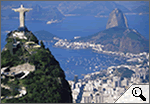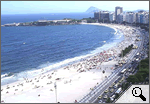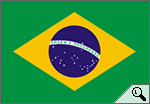|
|
|
|
 |
 |
 > The Marvellous City > Focus on tourism > Brazil dimarts, 6 d'octubre de 2009
Last Friday, 2 October, the International Olympic Committee (IOC) chose Rio de Janeiro to host the 2016 Olympic Games. It was the first time a South American city had secured the Olympic nomination.
To win, the Brazilian city defeated the other three candidates: Chicago (United States), Madrid (Spain) and Tokyo (Japan). Chicago and Tokyo lost in the first two rounds, and in the final round Rio de Janeiro received 66 votes against 32 for Madrid. The votes were in line with forecasts which placed Rio as favourite; something the Brazilian president Luiz Inácio Lula da Silva knew how to make the most of when he delivered a passionate and convincing speech. President since 2002, Lula is admired as a politician in South America and throughout the whole world for his efforts to move the country forward and to achieve recognition for Brazil as an emerging power in the economic and political arena. We shouldn't forget that in 2014, two years before the Olympics Games in Rio de Janeiro, Brazil will host another sporting event that is popular throughout the whole world: the FIFA World Cup. The Marvellous CityLocated on the coast of the Atlantic Ocean, Rio de Janeiro is considered to be one of the most fascinating and beautiful cities in the world. The Marvellous City, as it is also known, is situated to the south of Guanabara Bay. At the mouth of the bay is the famous Sugarloaf Mountain, next to Botafogo beach. Also famous all over the world is the statue of Christ the Redeemer, on Corcovado Hill, at an altitude of more than 700 m.
Focus on tourismRio de Janeiro has a population of 6 million and almost 12 million counting the metropolitan area. It is Brazil's most touristic city on account of its beaches (Copacabana, Ipanema, Botafogo, etc.) and the massively attended carnival, the most famous in the world, along with that of Venice. However, there are marked differences between Rio's rich and poor: exclusive districts are found side by side with the 'favelas', areas where people live in extremely impoverished conditions.
BrazilWith a population of nearly 200 million, Brazil is one of the world's largest democracies and, in recent years, has consolidated its position as an emerging power: it is a member of the G-20, a group comprising the world's 20 largest economies. The most densely populated city (even more so than Rio de Janeiro) is Sao Paulo. However, the capital city is Brasilia, which was built in 1960.
|
Investiga

> Rio de Janeiro aconsegueix els jocs del 2016: anunci.

> Vídeo de presentació de Rio 2016.
I també...
- Perfil del Brasil.
- Diccionari bàsic anglès-portuguès.
- Dos mapes de Rio de Janeiro.
- Rio, pàtria de la samba i de la 'bossa nova'.
Portada |
Europa Press |
El Punt |
La premsa |
Especials |
Diari de l'escola |
LesFinances.info |
Editorials |
Mail obert |
Els blocs |
Lletres
Tecnologia i ciència | Solidaritat | Cap de 7mana | Campus | El 9 | Presència | Fòrums | Enquestes | Xat | Correu
Traductor | Edicions en Pdf | Wap-pda | Biblioteca | Lletra més grossa
Tecnologia i ciència | Solidaritat | Cap de 7mana | Campus | El 9 | Presència | Fòrums | Enquestes | Xat | Correu
Traductor | Edicions en Pdf | Wap-pda | Biblioteca | Lletra més grossa
| Què és VilaWeb? Publicitat Mapa web Contacte | Una web de Partal, Maresma i Associats, S.L. |






